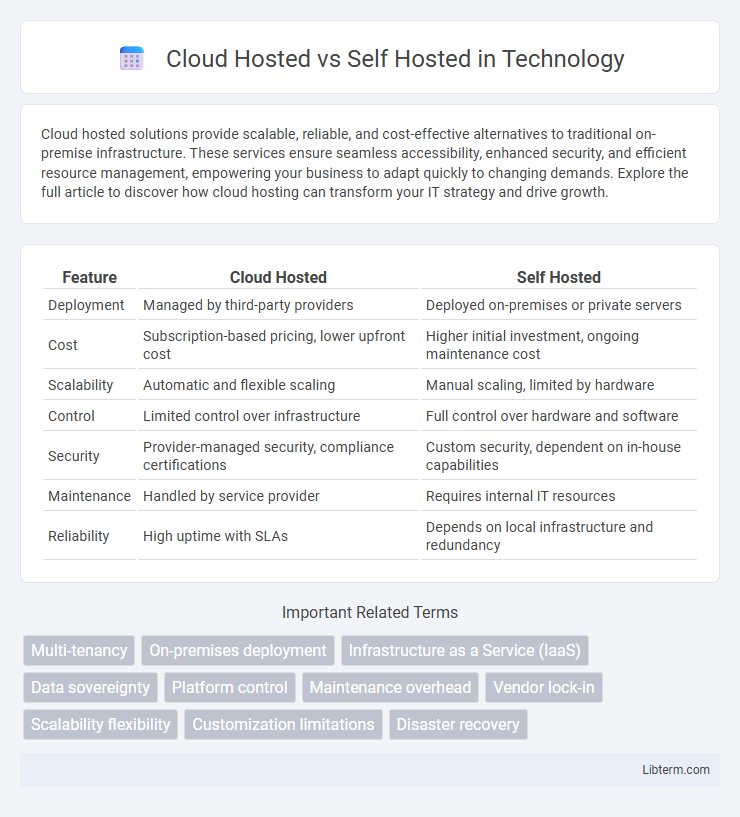Cloud hosted solutions provide scalable, reliable, and cost-effective alternatives to traditional on-premise infrastructure. These services ensure seamless accessibility, enhanced security, and efficient resource management, empowering your business to adapt quickly to changing demands. Explore the full article to discover how cloud hosting can transform your IT strategy and drive growth.
Table of Comparison
| Feature | Cloud Hosted | Self Hosted |
|---|---|---|
| Deployment | Managed by third-party providers | Deployed on-premises or private servers |
| Cost | Subscription-based pricing, lower upfront cost | Higher initial investment, ongoing maintenance cost |
| Scalability | Automatic and flexible scaling | Manual scaling, limited by hardware |
| Control | Limited control over infrastructure | Full control over hardware and software |
| Security | Provider-managed security, compliance certifications | Custom security, dependent on in-house capabilities |
| Maintenance | Handled by service provider | Requires internal IT resources |
| Reliability | High uptime with SLAs | Depends on local infrastructure and redundancy |
Introduction to Cloud Hosted vs Self Hosted
Cloud hosted solutions offer scalability, remote accessibility, and managed maintenance through third-party providers, reducing upfront hardware costs and IT staffing. Self hosted systems require on-premises hardware and infrastructure, giving organizations full control over data security, customization, and network performance. The decision between cloud hosted and self hosted depends on factors such as budget, compliance requirements, and desired levels of flexibility and control.
Key Differences Between Cloud and Self Hosting
Cloud hosting offers scalable resources, managed infrastructure, and reduced maintenance costs by leveraging remote servers maintained by third-party providers, while self hosting requires on-premises hardware management, higher upfront investment, and full control over data and security protocols. Cloud environments provide automated backups, seamless updates, and global accessibility, contrasting with self hosting's dependence on in-house IT teams for hardware maintenance and system upgrades. Performance in cloud hosting benefits from distributed data centers and load balancing, whereas self hosting performance is constrained by local infrastructure capacity and network limitations.
Cost Comparison: Cloud Hosted vs Self Hosted
Cloud hosted solutions typically involve predictable monthly or usage-based costs, eliminating expenses related to hardware, maintenance, and IT staff. Self hosted options require significant upfront investment in servers, ongoing maintenance, and utilities, resulting in higher initial capital expenditure but potentially lower long-term costs if managed efficiently. Cost comparison favors cloud hosting for scalability and reduced operational overhead, while self hosting suits organizations with stable workloads and internal resources to manage infrastructure.
Security Considerations for Both Hosting Types
Cloud-hosted environments offer robust security features such as automated patch management, advanced threat detection, and distributed denial-of-service (DDoS) protection, but they require continuous monitoring to address shared responsibility model gaps and potential data privacy compliance issues. Self-hosted solutions provide full control over security configurations, allowing organizations to implement customized firewalls, intrusion detection systems, and data encryption tailored to specific regulatory requirements; however, they demand dedicated IT resources for regular updates and vulnerability management. Evaluating security frameworks like ISO 27001, understanding physical security controls, and assessing incident response capabilities are critical for both cloud-hosted and self-hosted infrastructures to mitigate risks effectively.
Scalability and Flexibility: Which is Better?
Cloud hosted solutions offer superior scalability by automatically adjusting resources based on demand, ensuring seamless performance during traffic spikes. Self hosted environments provide greater flexibility for custom configurations and control over hardware but require manual intervention to scale, potentially causing delays. Businesses prioritizing rapid growth and variable workloads benefit more from cloud hosting, while those needing tailored setups with stable demand might prefer self hosting.
Maintenance and Technical Support Needs
Cloud-hosted solutions minimize maintenance by offloading server management, software updates, and security patches to the provider, reducing the need for in-house technical expertise. Self-hosted environments require continuous upkeep, including hardware maintenance, software upgrades, and troubleshooting, demanding dedicated IT staff and higher operational costs. Technical support for cloud-hosted services is typically available 24/7 from the vendor, whereas self-hosted systems rely on internal teams or third-party contracts for issue resolution.
Performance and Reliability Analysis
Cloud hosted solutions offer scalable performance with built-in redundancy, reducing downtime risks through data replication across multiple servers. Self hosted environments provide greater control over hardware specifications, allowing for tailored optimizations but requiring dedicated resources to maintain reliability and minimize latency. Performance in cloud hosting benefits from elastic resource allocation, while self hosting demands proactive infrastructure management to ensure consistent uptime and speed.
Customization and Control: Pros and Cons
Cloud-hosted solutions offer ease of customization through scalable, vendor-managed platforms but may limit deep control over infrastructure and specific configurations. Self-hosted environments provide full control and extensive customization possibilities, allowing businesses to tailor every aspect of the system, but require significant technical expertise and resources for maintenance. Choosing between the two depends on whether priority lies in flexible customization with reduced management overhead or comprehensive control with increased responsibility.
Ideal Use Cases for Each Hosting Solution
Cloud hosted solutions are ideal for businesses seeking scalability, minimal upfront costs, and remote accessibility, making them perfect for startups, rapidly growing companies, and organizations with distributed teams. Self hosted environments offer greater control, enhanced security, and customization, which suits enterprises with stringent compliance requirements, sensitive data handling, or specific infrastructure needs. Hybrid models can also combine benefits, supporting businesses that require both flexibility and control over their IT resources.
Choosing the Best Hosting Option for Your Business
Cloud hosted solutions offer scalable resources, reduced upfront costs, and automatic updates, making them ideal for businesses seeking flexibility and ease of management. Self hosted options provide greater control, enhanced security, and customization capabilities, which suit enterprises with specific compliance requirements or complex infrastructure needs. Evaluating factors such as budget, technical expertise, data sensitivity, and growth projections is essential to choosing the best hosting option for your business.
Cloud Hosted Infographic

 libterm.com
libterm.com